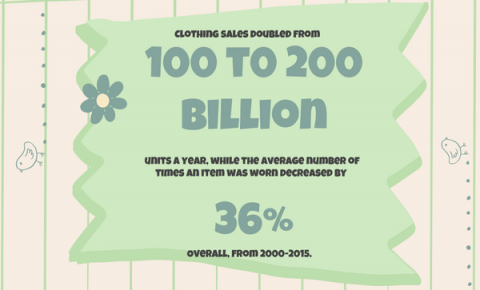How to Avoid Fast Fashion: A Guide to Buying Ethically
Fast Fashion 101 Seminar Recap:
Created by Lola Lancaster
Students for Sustainability presented a Fast Fashion 101 Seminar at their February 8th meeting. Students learned the standard definition of fast fashion, as well as many of the ways those production practices cause water and soil pollution, fossil fuel usage, carbon emissions, and landfill waste. The presentation also discusses the poor pay and working conditions that employees fast fashion companies face, as well as which companies qualify as fast fashion. Students talked about ways to buy ethically, such as purchasing locally and secondhand, as well as not overbuying. Students dissected sustainability statements released by some of the biggest fast fashion companies and learned how to detect green washing from brands. One of the highlights was using the sustainability ranking tool on the website “GoodOnYou”, a page that provides ratings on the sustainability of clothing brands and breaks down how they contribute to the environment. Everyone offered up different brands, good and bad, to see what their scores looked like and why. Students also shared ways that they reuse and upcycle clothes and were taught some new ways to reuse and donate clothes that no longer serve them.
The presentation can be viewed here.
How to Avoid Fast Fashion: A Guide to Buying Ethically
So what is Fast Fashion?
Fast Fashion is the mass production of cheap clothing by retailers to reflect recent trends and fads that have a huge impact on the environment.
Why is Fast Fashion Bad?
- The toxic dyes that many of these garments are made with have severely polluted waterways.
- The significant increase on these mass-produced items contribute to fossil fuel usage and carbon emissions. Fast Fashion accounts for up to 10% of global carbon dioxide output—more than international flights and shipping combined.
- The production of these garments requires lots of cotton- which requires excess amounts of water and uses insecticides and pesticides. These chemicals are absorbed into soils and waterways causing more pollution.
- There are approximately 92 million tons of clothes related landfill waste a year. Due to the trendy nature of fast fashion, these clothes are only worn a few times before being discarded.
- Due to high demand, met with cheap cost, employees are forced work in unsuitable conditions for small wages to keep up. The production of these clothes is almost entirely done in countries with no wage regulation, so employees are usally being exploited.These same people are also exposed to dangerous chemicals in toxic amounts, such as highly fluorinated compounds, which have been proven to cause cancer.
How can I buy ethically?
- Shop local, small businesses
- Look at prices and think about labor costs (the cheaper an item is the more likely its fast fashion)
- Buy second hand
- Learn how to identify ethical brands from fast fashion (theres many apps for that)
- Do not over purchase
Resources of secondhand stores in Lafayette:
Thrifiting:
- Goodwill (local locations here)
- The Arc of Acadiana
- Salvation Army
Resconsignment:
- Plato’s Closet
- Clothes Mentor
- Clothing Loft
- Upscale Resale
Vintage:
- Habibi Vintage
- Lilou
- Advintage Thrifts
Search for your favorite brands to see if they pass the test:
Visit GoodOnYou to see how your favorite brands are scored

